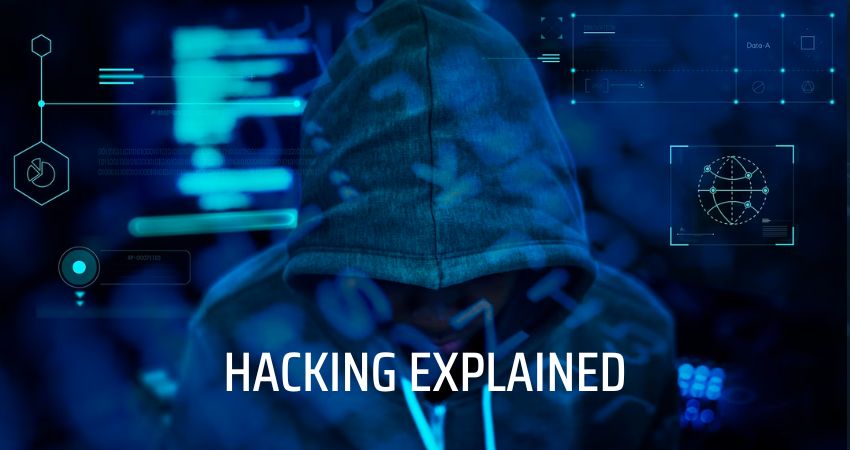Table of Contents
Introduction
In today’s digital landscape, comprehending the intricate world of hacking is no longer an option but a necessity. This beginner’s guide to hacking aims to unravel the mysteries for newcomers, shedding light on the fundamentals of hacking and illustrating how it can be harnessed responsibly and ethically.
1: What is Hacking?
Grasping the Fundamentals
Hacking, at its core, involves gaining unauthorized access to computer systems or networks. It’s crucial to distinguish between hacking and ethical hacking, where the latter employs hacking skills for legitimate and lawful purposes. Additionally, understanding the various hacker archetypes, including Black hat hackers (engaged in illegal activities), White hat hackers (defenders of systems), and Grey hat hackers (somewhere in between), is key to navigating this multifaceted realm.
The Driving Forces behind Hacking
Hacking is driven by diverse motives, such as financial gain, corporate espionage, digital activism, and even the sheer curiosity and thrill of exploration. Each motive dictates different approaches and targets, underscoring the complex ethical and legal dimensions associated with hacking.
2: The Hacking Process
The Tools in a Hacker’s Arsenal
To execute hacking techniques, hackers rely on a toolkit of specialized software and tools. Familiarity with programming languages like Python is also common. Maintaining anonymity and privacy is paramount to avoid detection and consequences.
Phases of Hacking
Hacking typically involves several phases:
Reconnaissance: Gathering essential information about the target.
Scanning and enumeration: Identifying vulnerabilities within the target.
Gaining access: Exploiting those vulnerabilities to penetrate the system.
Maintaining access: Ensuring continuous control over the compromised system.
Covering tracks: Erasing evidence of the intrusion.
Popular Hacking Techniques
Some prevalent hacking techniques include:
Password cracking: Attempting to decipher or bypass passwords.
Phishing attacks: Crafting deceptive emails or websites to harvest sensitive information.
Social engineering: Manipulating individuals into revealing confidential data.
Malware and viruses: Disseminating malicious software.
Exploiting vulnerabilities: Leveraging system weaknesses to gain access.
3: Safeguarding Against Hacking
Cybersecurity Measures
Protecting against hacking attempts involves a range of measures:
Employing strong, complex passwords.
- Implementing Two-Factor Authentication (2FA) for added security layers.
- Keeping software and operating systems up-to-date to patch vulnerabilities.
- Employing firewalls and antivirus software to fend off malware.
Best Practices for Online Safety
Online safety hinges on several practices:
- Recognizing phishing attempts and avoiding suspicious emails and links.
- Exercising caution when navigating the internet to steer clear of dubious sources.
- Fortifying Wi-Fi network security with robust passwords.
- Regularly backing up critical data to mitigate potential loss.
4: Ethical Hacking
The Role of Ethical Hackers
Ethical hacking involves the responsible and legal application of hacking skills. Ethical hackers play a pivotal role in identifying and rectifying security flaws within systems, applications, and networks. Their mission is to bolster cybersecurity measures and protect against malicious hackers.
Steps to Becoming an Ethical Hacker
To embark on a career as an ethical hacker, consider the following steps:
- Acquire education and training in cybersecurity and hacking techniques.
- Pursue relevant certifications, such as the Certified Ethical Hacker (CEH) certification.
- Construct a portfolio showcasing ethical hacking expertise and accomplishments.
5: Learning Resources for Aspiring Hackers
Recommended Learning Materials
For beginners, these learning resources are invaluable:
- Essential books that provide a solid foundation in hacking and cybersecurity.
- Online platforms, forums, and websites dedicated to disseminating hacking knowledge.
- YouTube channels and tutorials offering practical guidance for aspiring hackers.
Practical Learning Experience
To refine your hacking skills:
- Establish a controlled and secure hacking environment for practical exercises.
- Engage in Capture The Flag (CTF) challenges to apply and assess your skills.
- Participate in hacking communities and forums to learn from experienced hackers.
FAQs
What is hacking, and how is it different from ethical hacking?
What are the main motivations behind hacking?
How can I protect myself from hacking?
What are the essential skills and qualifications required to become an ethical hacker?
Where can I find resources to learn hacking and cybersecurity?
Conclusion
Understanding hacking goes beyond the acquisition of technical knowledge; it entails recognizing the ethical responsibilities that accompany this knowledge. In an evolving landscape of hacking and cybersecurity, staying informed and using your skills ethically and responsibly are paramount. Whether you aspire to defend against hackers or join the ranks of ethical hackers, this guide provides a strong foundation for your journey into the realm of hacking.
Read More Articles
The Ultimate Guide to Cyber Security Essentials
Don’t Be a Victim: Protect Your Online Privacy
Passwords Are Dead: Alternatives for Strong Security
Phishing Attacks: Recognize and Avoid
Internet of Things (IoT) Security Challenges

